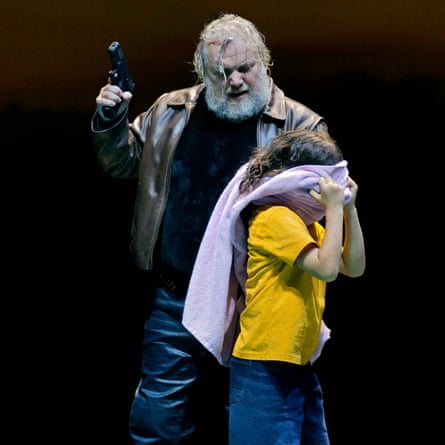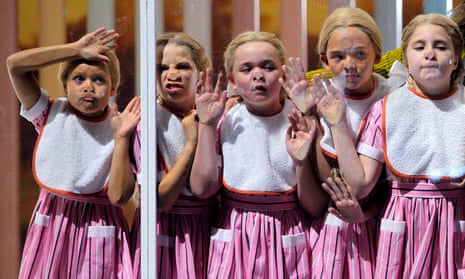Who knew? Wagner’s monumental Ring cycle isn’t a saga of gold, power and love after all. That was merely what the composer thought. In fact the Ring is a tale of child abduction and dehumanisation. Or at least that is what the Austrian director Valentin Schwarz seems to be arguing in the first part of this long awaited new Ring cycle at the Bavarian festival where the work itself was premiered in 1876.

Bayreuth’s new Ring has been longer in the making than planned since the last cycle in 2017. There have been changes of director, delays caused by the pandemic, power struggles within the festival itself and, less than three weeks ago, the conductor Pietari Inkinen was forced to pull out because of Covid (Bayreuth says he will be back next year). The baton passed to the Stuttgart opera music director Cornelius Meister, who opened the Ring with a well-paced, fluent account of Das Rheingold, beautifully played by the Bayreuth festival orchestra.
Bigger tests are to come as the cycle unfolds. This is certainly true of Schwarz’s concept-heavy production, in which Rheingold opens in a children’s paddling pool in an Arcadian setting, from which Alberich, renouncing love for no obvious reason, seizes a young boy in a gold football shirt under the noses of jaunty Rheinmaiden nannies. It is a jolting and topical predatory moment, and the idea that the original sin that drives the Ring and the world of power is in fact the abuse of children is a searing one.

The larger question is whether it is an idea that can be sustained over the whole of the Ring without mangling what Wagner wrote. Even in Rheingold, much was brushed aside. Predictably, in this Ring with no gold and no ring, the staging, in Andrea Cozzi’s eclectic sets and Andy Besuch’s costumes, dispenses with all other Wagnerian props.
All the same, there are pregnant possibilities. The young abductee, brutalised and feral, is Götterdämmerung’s Hagen in the making. The school-uniformed girls he tyrannises may be embryonic Valkyries. And the potential purging of a rotten and heartless world is the enduring Wagnerian theme of themes.
Vocally, Bayreuth standards are more often decent than stellar these days. So it proved here. Egils Silins is a light voiced Wotan, even more absurdly imprisoned in his Valhalla delusions than ever. Olafur Sigurdarson stands out as Alberich, though there were some strains on opening night. Daniel Kirch is an elegantly sung Loge and Okke von der Damerau brings a touch of old school operatic grandeur to Erda. Watch this space. This Ring cycle could go either way.
